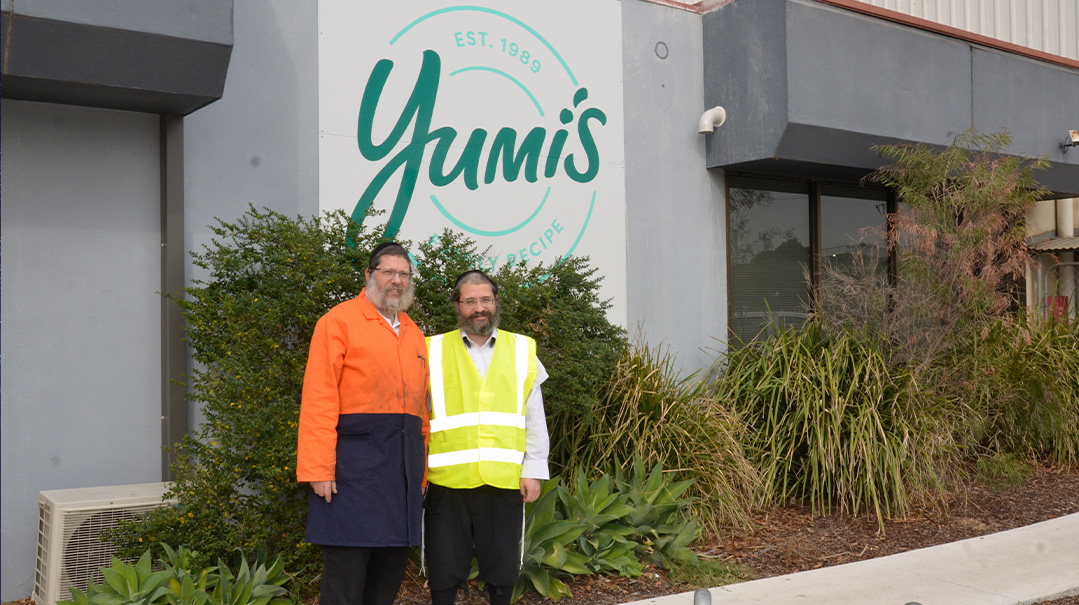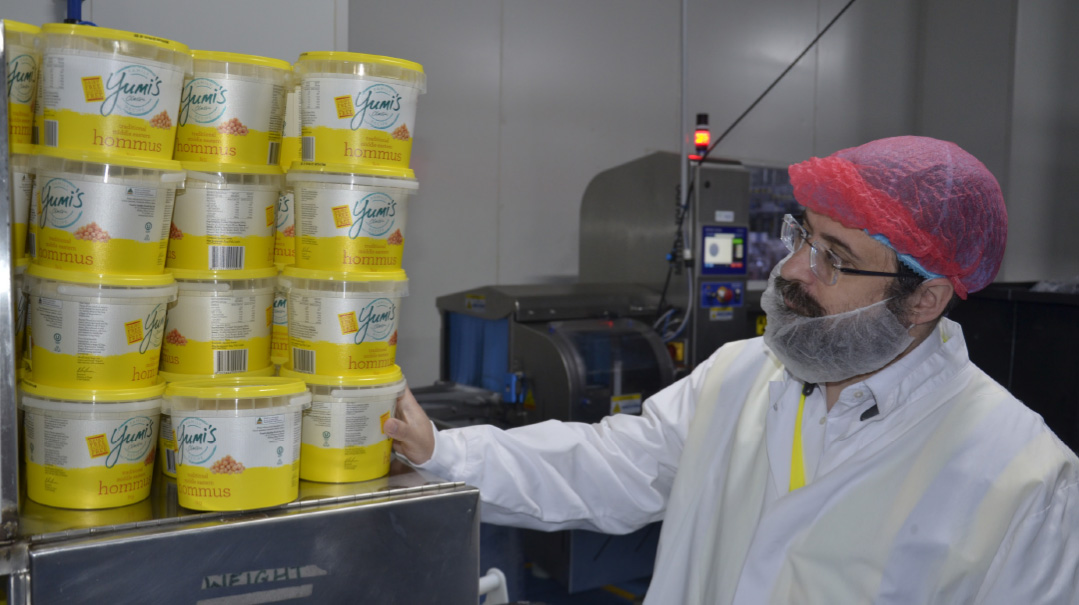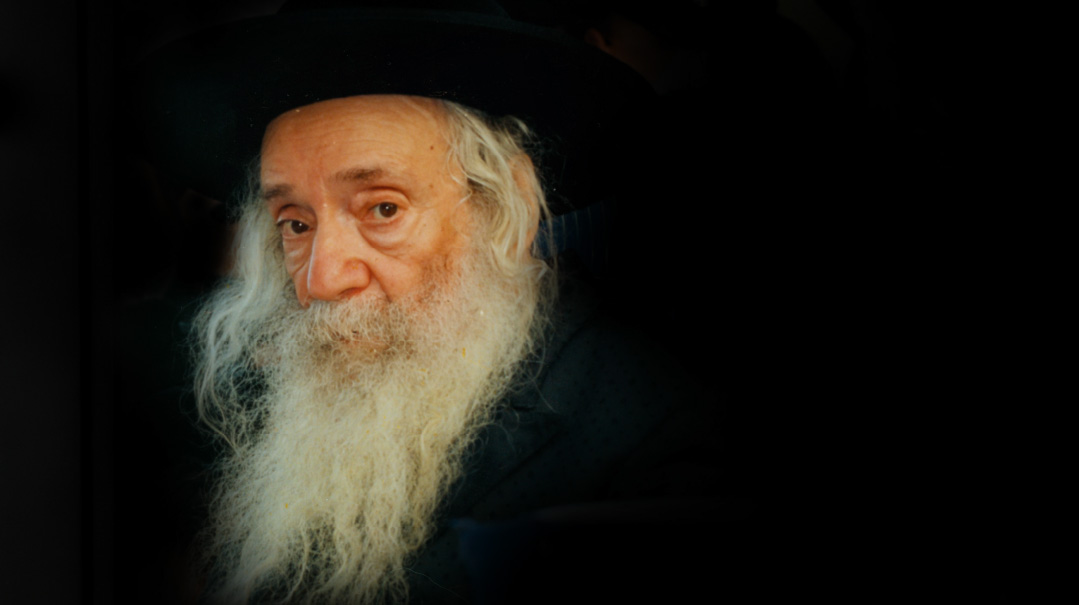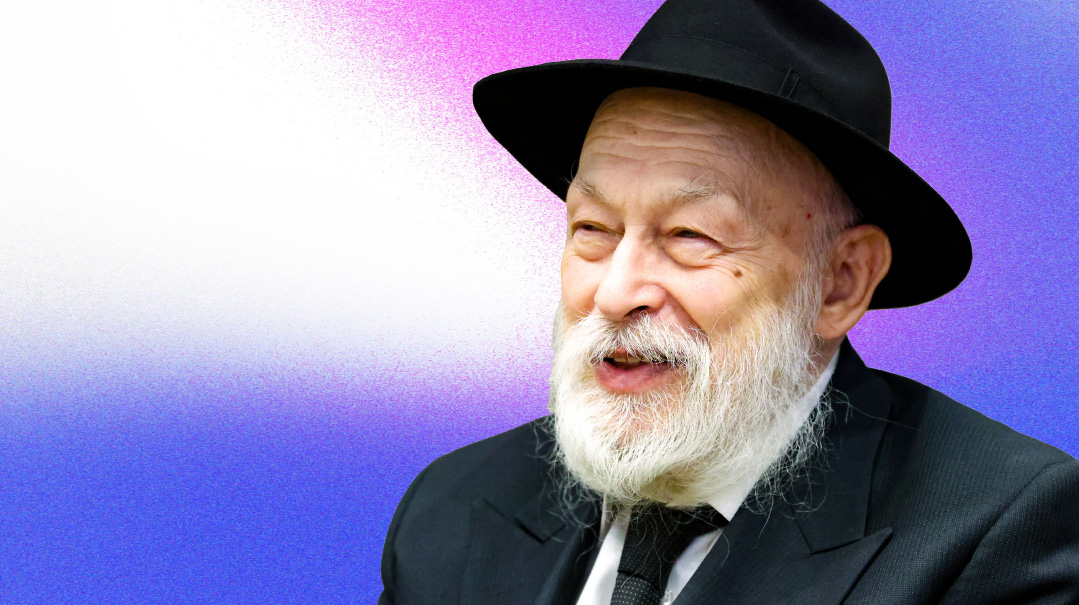Chip & Dip

Yumi and Moishy Friedman bring heimish flavor to their Australian enterprise

By David Damen, Melbourne
Yumi and Moishy Friedman started selling fish from a storefront and preparing salads in the shul kitchen in Melbourne. Today they’re sitting on a multi-million-dollar enterprise — who in Australia doesn’t have a container of Yumi’s dips in their refrigerator? While their little business has grown into the largest such product line on the continent, they still see themselves as two simple chassidic brothers just trying to make a kiddush Hashem
Ifirst meet Moishy and Binyamin (Yumi) Friedman in Melbourne’s Adass Israel shul, engrossed in their daily learning session, having cleared their minds of their 200-plus employees at the largest dips factory in Australia and the hundred tons of dips and salads it produces every week.
But I’m not the only one to be surprised. So are many of the business contacts who meet the two chassidish brothers for the first time. And they’re even more surprised when they learn that the little home-based dips business that started in the shul’s kitchen would morph into a multi-million-dollar enterprise.
On the drive to the factory, about a half hour away from Melbourne, Moishy shares about those early days, long before the big dream and how it’s played out in ways they could never imagine.
And I have my own good fortune: “They won’t let you in,” many helpful people in the community predicted darkly when I began to inquire about a potential visit to the factory during my memorable visit down under. And they were right. The brothers are exceedingly protective of their privacy, and it’s rare that visitors are let in the door. But some generous mood overcame their secrecy, and here I was — and what I discovered there far exceeded anything I could have imagined.
Fish Food
It all began in a modest fish store on Glen Eira Avenue, behind the courtyard of the Adass Israel shul. The store belonged to a Greek expat who couldn’t drum up Jewish business no matter how hard he tried, until he found a Jewish partner, a young chassid named Binyamin Friedman (a.k.a. Yumi).
“After Yumi went into partnership with the Greek fellow, I eventually bought him out and became my brother’s partner,” says Moishy. “Yumi would get up at two in the morning to go to the market, in order to get the best merchandise available. We renovated the store and expanded it, and at the same time, Yumi began preparing home-style dips in the shul’s kitchen.”
The brothers — hailing from a prominent family of Belzer chassidim — began to produce a line of high-quality fish products, and in 1999, they purchased their first factory, a modest 1,200-square meter facility. But business began to boom, and just two years later, they moved to the much larger current factory in the town of Hallam. Initially they used only part of it, and rented out the rest. From a little backroom operation in the shtibel, the factory began to produce dips on an industrial level, barely keeping up with the demand.
Over the years, the “Yumi” brand expanded from fish products to a full range of dips, salads, and snacks, including the national favorite — a one-kilo tub of hummus — and a variety of falafel products sold in supermarkets, cafés, restaurants and takeout places around the country and beyond.
“The fast pace of the growth actually became a source of concern,” Moishy says. “We had to get new machines, and it required a tremendous financial investment. We began to struggle, but were saved when Anacacia Capital, a private equity firm, took a majority stake in Yumi’s in 2014. While Yumi’s doesn’t disclose their revenues, when Anacacia took a stake in the business eight years ago, it was said that the company only invested in operations that would produce a turnover of over $20 million.
This morning, before we set out to the factory, we paid a visit to the original storefront where it all began and which is today just a tiny part of the brothers’ income, enjoying some fresh, delicious fish patties that had just come out of the frying pan. They still hold onto the store, which is efficiently managed by their mother and keeps her gainfully employed. The brothers say they have an ulterior motive as well: This way they never have to look for parking near the shul. They park at the back gate of the store, right under the shul’s courtyard.

Moishy examines the production line of the national favorite: Yumi’s one-kilo tub of hummus
The Transfer
Yumi and Moishy have created a practical division of labor. While Moishy is the seasoned businessman, his older brother Yumi is the hands-on partner, who not only stirs up great recipes, but also doesn’t miss out on a single technical concept that might improve production. He doesn’t go to the fish market anymore, but he does still get up at two a.m., goes to the mikveh, sits down to learn for a few hours, davens at sunrise, and then is off to the factory.
Yumi, his family members agree, has golden hands, and created many of the systems used on the production line. And despite the business’s success, he hasn’t altered his schedule. He still arrives at work at the same time each day, donning safety overalls and boots, and during some free moments, escapes to his favorite corner, the metalworks room. There, wearing safety goggles, he solders pipes and valves and produces many of his own parts for the factory’s machines.
Now, in 2022, the factory — the largest producer of hummus in Australia — produces 100 tons of salads and dips each week — and half of that is hummus. But although it still bears the name of its founder, the Friedman brothers don’t actually own it anymore.
While the famous “Yumi’s” labels on the products haven’t changed, the company was actually sold in 2018. British food mogul George Weston, who own part of the $32 billion Associate British (AB) Foods empire, had an appetite for it, purchasing the entire company from the Friedman family and buying out Anacacia Capital’s majority stake.
George Weston and his company are the owners of dozens of food factories and international brands in the food industry around the world. (The popular international clothing and accessory chain, Primark, also belongs to his corporation.) After months of negotiations, ownership of Yumi’s was transferred to the British company, but George Weston had one very firm condition: The Jewish brothers had to commit to managing the factory for at least three years after the purchase. Aside from the fact that the factory is now open seven days a week, as it is no longer Jewish-owned, everything remains the same — including the hechsher.
Meanwhile, although three years have long passed since the acquisition, the Friedman brothers are still managing the factory at George Weston’s behest.
While the factory has officially changed hands, the lot on which it stands is still owned by the brothers. They’ve recently purchased the adjacent lot, and the factory — which now operates 24/7 in order to keep up with the demand — will be expanding onto it in order to increase the production capacity.
Endless Supply
We arrive at the factory, and Moishy ushers me into his office. There’s a kosher coffee machine, an array of framed certificates on the wall from tzedakah and chesed organizations, pictures of rabbanim, and photos of the present and past Belzer Rebbes.
Moishy (who is known as Michael in corporate circles) takes leave of me to attend a board meeting, where approval for new products and some expansion moves will be discussed. The management will also need to deal with the global shortage of raw materials, due to Covid restrictions and the war in Ukraine.
From there I meet with Yumi, who comes in from the bustling factory. At first, I don’t even recognize him. He’s wearing multiple layers, a tightfitting mask, and his head is wrapped, according to regulations. But in a few minutes, I’m also wearing those same layers — here there are no shortcuts when it comes to safety and hygiene rules. There are even automatic Covid detectors that locate any employee with an elevated body temperature. (Recently, several tons of olive dip had to be dumped because some pieces of plastic accidentally got into the production line.)
It’s hard to imagine a production line of such magnitude unless you’re actually standing near those mammoth machines, which spit out ready containers of salads and dips at a dizzying rate.
How many types of salads and dips are prepared here? I try to stick in a question despite the thunderous din of the machines.
“Fifty to sixty kinds, in about 120 different kinds of packages,” Yumi shouts back.
All the machines are working at top speed — without human touch from the production to the packaging to the storage in the boxes. The massive machine I’m standing next to produces two and a half tons of dips every day.
I make my way between the massive vats that can hold thousands of liters of oil, gargantuan barrels of chick peas, and a complicated construction of endless pipes and channels that transport ingredients from one place to the other in a way that only Yumi and his skilled staff can understand. Not only did Yumi actually design most of these systems himself, but he himself spends lots of time on the production floor, like a lower-level employee.
From there, we go to the massive storage area, which consists of endless lanes with massive quantities of raw materials. New pallets of ingredients are constantly being delivered by a fleet of trucks, and in the current compromised supply climate, the steady stock of raw materials is nothing short of heroic.
It’s in the Name
Yumi leads me to the corner he loves most — the metalworks room — where he supervises a team of skilled workers who produce and solder pipes and machine parts. Since the acquisition, the parent company has infused millions of dollars into Yumi’s in order to provide whatever the company needs for the rapid growth, from advanced equipment to fat advertising budgets. This year alone, the company has invested about $4 million on new equipment.
And then comes the question of the day: How does it feel to be the “Yumi” whose name appears on packages in practically every refrigerator in Australia?
Yumi smiles. He’s so busy working, he says he doesn’t even think about it.
Same with their plans for the future. This factory is their life, their investment of heart and soul. But once they’ve sold at a phenomenal price, other quiet thoughts creep into their consciousness. Moishy has even started talking about a possible move to Lakewood.
Meanwhile, this chassidic pair continues to manage one of the largest food companies in Australia. Still, you can find Yumi every Sunday in his work clothes, fixing broken furniture and other paraphernalia in the Adass Israel shul. He installed the community’s matzah bakery himself, from the sophisticated oven to the efficient tools. And you can find Moishy on the community Vaad, where he contributes his many talents and experiences to develop the various community projects. And come Shabbos, they take off their work clothes and don their shtreimels and beketshes, leaving the pressure of the week behind — although not entirely. Because there will surely be some Yumi’s salads on the Shabbos table too.
(Originally featured in Mishpacha, Issue 937)
Oops! We could not locate your form.







